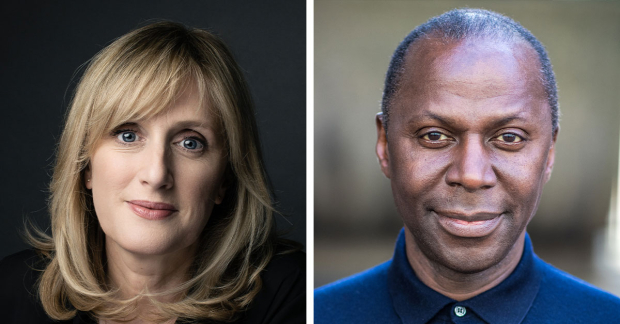”Further than the Furthest Thing” at Young Vic – review

© Marc Brenner
It’s a strange decision on the part of the Young Vic to revive Zinnie Harris’s first play. Although it won multiple awards when it premiered in 1999, and has been much produced since then, it’s an oddly sluggish beast, bogged down by its own metaphors.
It is loosely based on the story of the remote island of Tristan da Cunha, evacuated in 1961 after a volcano eruption. On Harris’s imaginary island, the inhabitants are so cut off from the outside world that they evolve a completely separate way of living, and survive on a diet of potatoes, crayfish and “pinnawin h’eggs” because they have also developed a habit of adding ‘h’s to random words.
The first act paints a picture of the isolated community through the eyes of Francis (a gently resistant Archie Madekwe), returning to the island and to his aunt Mill (Jenna Russell) and uncle Bill (Cyril Nri) after a stay away. He brings with him Mr Hansen, a Cape Town businessman (suave Gerald Kyd), who wants to open a factory.
Slowly, slowly and with a lot of poetic repetition, events unfold as the islanders resist his intrusion. Meanwhile, Bill is bothered by the sound he hears from the water; which, of course, is the volcano about to erupt. For a play with such a dramatic explosion at its heart plus a shocking moral dilemma involving Francis’s love for the pregnant Rebecca (Kirsty Rider) and what has happened to her while he was away, the action is surprisingly lacking in tension.
But the really peculiar thing about the play is that what happens in the first half – in which a terrible act occurs – seems to have very little to do with what happens in the second, when the residents are seen working in a canning factory in Southampton, lost and cut off from their traditions, longing to return and being prevented from doing so. In particular, the relationship between Francis, who always felt constricted by his island life, and his relatives deteriorates still further.
In the course of this half of the play, another terrible act is described in gripping detail by Jenna Russell whose calm and subtle presence lends the production a grave centre and most of its power. But once again the profound moral dilemma that is raised, goes for nothing. More things happen and the play ends.
It’s baffling, a touch melodramatic and very frustrating. You can see that Harris is fascinated by this community and the values of self-reliance it represents. She touches on the theme of imperialism, as the islanders’ pride is ignored and undermined by a colonial power that lies to them. Her language is beautifully crafted.
But the slowness of the words undercuts the power of the narrative as the constant archaisms push the people away from our understanding of them. For all the commitment of the acting, they remain cyphers rather than people.
Jennifer Tang’s production is equally chilly. It looks wonderful, set by Soutra Gilmour in the round, with Prema Mehta’s clever lighting and Ian William Galloway’s projections representing the sea and the island in the first act, and a harsh, revolving circle of benches evoking the losses of the second. The simplicity of the costumes – heavy cut cloth for the islanders, a white suit for Mr Hansen – is carefully and cleverly revealing.
But for all the care and attention lavished upon it, for me, the play remained stubbornly lifeless, as covered in ash as the island that it attempts to conjure.












